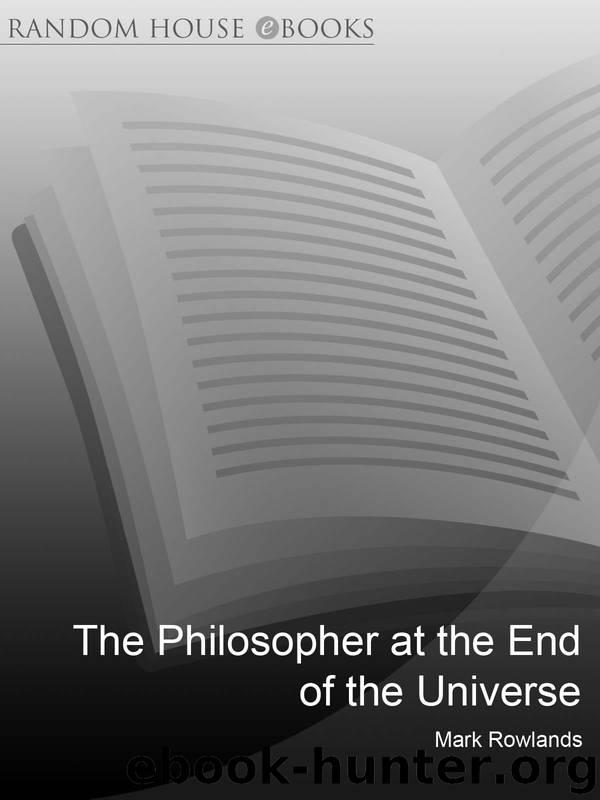The Philosopher at the End of the Universe by Mark Rowlands

Author:Mark Rowlands
Language: eng
Format: mobi, epub
Publisher: Ebury Publishing
Published: 2007-07-05T04:30:00+00:00
at least some human actions, choices and decisions do not have causes;
those actions, choices and decisions that do not have causes are, therefore, free.
Indeterminists are not committed to the idea that all human actions, choices and decisions are free. They can allow that some of these things have causes, and when this happens, the action, choice or decision, the indeterminist says, will not be free. What the indeterminist says is that at least some human actions, choices and decisions do not have causes, and when this happens, the action, choice or decision is free: it is free precisely because it doesn’t have a cause.
To those of you who think indeterminism rescues human freedom from the clutches of determinism, and who are not, therefore, worried by the argument for determinism, I say this: it’s time to be worried, it’s time to be very worried. Indeterminism cannot possibly work as an account of human freedom.
Suppose you were unfortunate enough to have a neurological condition that resulted in a pronounced nervous twitch. Suppose that every now and then your right arm shoots out horizontally from your side. You don’t have any control over this, because you don’t have any control over the neurological problem that causes it. So, you can be walking down the street, for example, minding your own business, when your arm shoots rapidly out to your side, hitting the nearest passer-by. Or you are out on a date, things are going very well, and you think you may just get lucky tonight, when, ‘whack!’, your arm shoots out and renders your date unconscious. Clearly you don’t have any control over this, and so the action of your arm moving out from your side is not a free one.fn1
Now, in this case, the movement of your arm has a cause, an annoying neurological condition. And because you have no control over the cause, you have no control over the movement either. Now imagine a slightly different scenario. Your arm shoots out in the same way, but this time it has no cause. What makes the arm move? Nothing, it just does. That’s what it means to say that it has no cause. Nothing makes it move – it moves for no reason. Now, if you’re like me, you’ll have a really hard time imagining this. But this is what the indeterminist requires us to imagine; for, according to the indeterminist, whenever a free action occurs, this is what it is like. The action is free when and only when it is not caused (or when it results from a decision or desire that is uncaused). Now, let’s give the indeterminist the benefit of the doubt, and suppose that she has described a coherent or imaginable situation. The question is this: is an action that comes about in this way a free one?
I think, pretty clearly, that it is not. In fact, it is no more a free movement when your arm shoots out for no reason at all than it is when it shoots out as a result of the neurological condition.
Download
The Philosopher at the End of the Universe by Mark Rowlands.epub
This site does not store any files on its server. We only index and link to content provided by other sites. Please contact the content providers to delete copyright contents if any and email us, we'll remove relevant links or contents immediately.
The Kite Runner by Khaled Hosseini(5178)
Gerald's Game by Stephen King(4654)
Dialogue by Robert McKee(4403)
The Perils of Being Moderately Famous by Soha Ali Khan(4220)
The 101 Dalmatians by Dodie Smith(3511)
Story: Substance, Structure, Style and the Principles of Screenwriting by Robert McKee(3468)
The Pixar Touch by David A. Price(3438)
Confessions of a Video Vixen by Karrine Steffans(3308)
How Music Works by David Byrne(3270)
Harry Potter 4 - Harry Potter and The Goblet of Fire by J.K.Rowling(3073)
Fantastic Beasts: The Crimes of Grindelwald by J. K. Rowling(3058)
Slugfest by Reed Tucker(3002)
The Mental Game of Writing: How to Overcome Obstacles, Stay Creative and Productive, and Free Your Mind for Success by James Scott Bell(2908)
4 - Harry Potter and the Goblet of Fire by J.K. Rowling(2702)
Screenplay: The Foundations of Screenwriting by Syd Field(2642)
The Complete H. P. Lovecraft Reader by H.P. Lovecraft(2563)
Scandals of Classic Hollywood: Sex, Deviance, and Drama from the Golden Age of American Cinema by Anne Helen Petersen(2524)
Wildflower by Drew Barrymore(2489)
Robin by Dave Itzkoff(2440)
